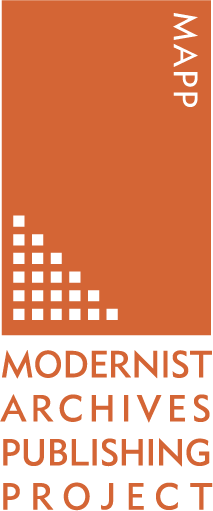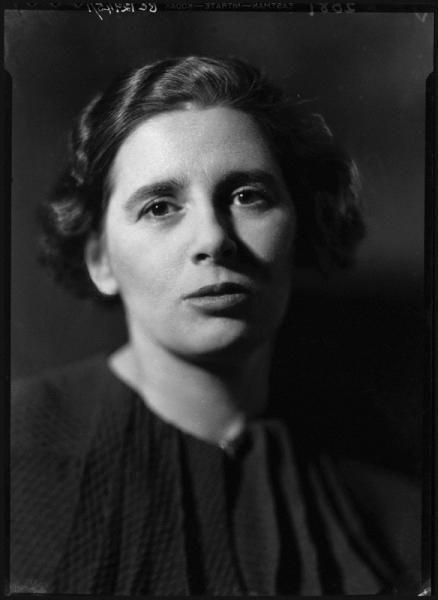Rebecca West
Rebecca West
Born:
London, United Kingdom
Died:
London, United Kingdom
Gender:
Occupation:
Biography
Authored By: Neil MacAlister
Edited By: Anna Mukamal, Claire Battershill, Helen Southworth
Rebecca West was born Cicely Isabel Fairfield in 1892. Her father, Charles Fairfield, was a lieutenant in the British army, a convicted gold and silver thief, and a highly-regarded Conservative journalist who—despite being a feature writer for the Melbourne Argus and having a brief stint as chief leader-writer of the Glasgow Herald—never made much of his literary abilities (Gibb 15-17, Orel 3, Rollyson 2). West’s mother Isabel had, according to West, all of the makings of a concert pianist, but never pursued a professional career (Rollyson 10). Both parents, however, encouraged West’s interests in art, politics, and debate.
West’s education at George Watson’s Ladies College ended early after tuberculosis derailed her studies, and a brief enrollment as an actress at the Royal Academy of Dramatic Arts in 1908 was also short-lived; she was there long enough, however, to play the role of Rebecca West in Ibsen’s play Romensholm, whose name she then took as her nom de plume (Deakin 14). As a teenager, West was a passionate suffragette and a member of the Women’s Social and Political Union (WSPU); this quickly lead to her joining suffragette Dora Marsden’s periodical The Freewoman, first as a writer and later as literary editor, and contributing her first article in 1911 (Gibb 4, 39; Rollyson 12). Her impressive writing would lead to a position at Robert Blatchford’s socialist journal, The Clarion, in 1912; Everyman magazine, also in 1912; the Daily News & Leader in 1913; and the New Republic in 1914 (Deakin 15, Gibb 41-48, Rollyson 16-17). During this period, she also began a sporadic relationship with married author H.G. Wells that would last for over a decade. Their child, Anthony Panther West, was born on 5 August 1914, a mere few hours after Britain declared war on Germany. Anthony West would become a novelist in his own right, but often took to attacking his mother in his writing for his tumultuous upbringing (Deakin 32, Gibb 58). In 1930, Rebecca West married Henry Maxwell Andrews, a banker whose numerous hidden infidelities would be revealed to her after his passing (Gibb 122).
From these journalistic beginnings, West went on to work prolifically for a variety of newspapers, periodicals, and magazines, including Time and Tide, The New York Herald Tribune, and the Times Literary Supplement; her reviews alone, across numerous mediums, number almost a thousand (Deakin 39, Orel 31). She also held regular positions or was contracted for series with Cosmopolitan, American Bookman, the New York Times, the Sunday Times, and the Sunday Telegraph (Gibb 102, 121, 201, 216, 225) After World War II the New Yorker commissioned her for articles that would become some of her best-known work. She covered the trial of British traitor William Joyce, the Nuremberg Trials, and a lynching case in South Carolina (Deakin 78). The Sunday Times published her pieces on such diverse topics as McCarthyism, the communist conspiracy she believed to be brewing in the United States, and, in 1960, South African apartheid (Gibb 201-216).
Many of her greater literary or political essays were collected in bestselling collections, such as the Jonathan Cape publication The Strange Necessity,which included, among several articles from the Tribune and New Statesman, a lengthy essay on art that famously deduced James Joyce as “a great man who is entirely without taste” (West, qtd. in Orel 34; Deakin 50). This essay would lead Joyce to allegedly attack West in his last novel, Finnegans Wake, through the character of the ‘Prankquean’, who “plagued Earwicker [the novel’s protagonist] as much as Rebecca West plagued Joyce” (Tindall 282; West 380). West had a particular fondness for the work of Henry James, Marcel Proust, and D. H. Lawrence: she wrote pieces on the former and the latter (her study Henry James in 1916, and her Elegy for Lawrence in 1930) and included reflections on Proust in The Strange Necessity (Orel 63). Many of West’s more political, treason-focused works were reprinted in 1947’s The Meaning of Treason and 1955’s A Train of Powder (both published through Viking), the former of which would lead Time magazine to label her “one of the greatest living journalists” (qtd. in Gibb 186). 1957’s The Court and the Castle, a collection of lectures West gave at Yale University on the subject of literary criticism (published through Yale University Press), has been called her “ripest and certainly her most extended consideration of the function of great literature over the past three and a half centuries” (Orel 40).
Between 1918 and 1966, West published seven novels (four others were published posthumously), and while reviews were sometimes critical, her work sold well, and several remain highly regarded pieces of 20th-century British literature—most notably her first and last novels, The Return of the Soldier (Century)and The Birds Fall Down (Macmillan) (Gibb 69, 230). Perhaps her most beloved work is Black Lamb and Grey Falcon, a Macmillan-published travelogue of war-torn Yugoslavia (Orel 84, Rollyson 128). The assassination of Yugoslavia’s King Ferdinand in 1934 had a profound effect on West, and she grew fascinated with the ways in which Eastern Europe would foretell the future of Europe’s political history (Orel 164); West later stated that she “discovered Yugoslavia as the source of everything that had driven her to become a writer” (Rollyson 128). Black Lamb and Grey Falcon is considered “one of the masterworks of the twentieth century” (Rollyson 104).
Virginia Woolf played a small but significant role in West’s life. Woolf and West “read, reviewed, and commented privately on each other’s work many times over their careers” (Mao 189) and maintained a mutual respect although they often fell into disagreement. Woolf was critical of West’s novels, calling Harriet Hume “tight and affected” and likening The Return of the Soldier to “an over-stuffed sausage” (qtd. in Gibb 79), but loved her journalism; she also mocked West’s fall into “middle class respectability” after her militant feminist beginnings (Gibb 115-130). West, in turn, could be critical of Woolf’s writings, reportedly effecting Woolf’s jubilancy after describing 1933’s Flush: A Biography as “not one of [Woolf’s] best… but rather braced” (Woolf IV 184). Woolf’s diaries mention several meetings, lunches, and excursions with West with often contradictory comments on her character: West is described as “a hardened old reprobate…but no fool” (III 184), a “very clever woman, rather rubbed about the thorax: with a great supply of worldly talk” (IV 131-2), and “a queer ill bred mind, with all the qualities I lack & fear” (IV 277). In the early days of Woolf’s Hogarth Press, West was one of the few non-Bloomsbury patrons (along with the likes of H.G. Wells and Hugh Walpole) to the Press’s early existence as a subscriber-model publisher (Willis 49).
In 1931, Woolf wrote to Rebecca West to ask her for a contribution to the Hogarth Letters, a series of twelve short contributions from various authors. This series was an attempt by Leonard Woolf to “pump up the press income” (Willis 266) of the struggling publishing house. West, “flattered… by the invitation” (West 131), agreed to write a piece entitled A Letter to a Grandfather. The story was an “extended meditation on a ruined Europe” (Rollyson 91) that depicted a young woman who receives and meditates on a vision of God, and writes to a grandfather who shared a similar gift. Her contribution was the twelfth and final edition in the Hogarth Letters.
Rebecca West died in 1983 at the age of 90, leaving behind an indelible legacy as a regarded novelist, essayist, and reviewer. Her life and career brought her to lunches with Ford Madox Ford, parties with F. Scott and Zelda Fitzgerald, and a brief relationship with Charlie Chaplin; it also found her joining the British Institute for Political Research and engaging in frequent communications with the FBI about the spread of communism (Gibb 186). The list of awards and honors West received is lengthy, including the Yugoslavian Order of St. Sava, honorary memberships in the American Academy of Arts and Letters and the Modern Language Association, and, most prestigiously, Dame of the British Empire (Orel ix). Her life, rife with variety, daring criticism, and experimental journalism, made her one of the most fascinating and controversial voices of the 20th century.
Works Cited
Deakin, Motley. Rebecca West. Twayne Publishers, 1980.
Gibb, Lorna. West’s World: The Extraordinary Life of Dame Rebecca West. Macmillan Press, 2013.
Mao, Douglas. “Rebecca West and the Origins of A Room of One’s Own.” Modernist Cultures, vol. 9, no. 2, 2014, pp. 186-212.
Orel, Harold. The Literary Achievement of Rebecca West. Macmillan Press, 1986.
Rollyson, Carl. The Literary Legacy of Rebecca West. International Scholars Publications, 1998.
Tindall, William York. A Reader’s Guide to Finnegan’s Wake. Syracuse University Press, 1969.
West, Rebecca. Selected Letters of Rebecca West, ed. Bonnie Kime Scott. Yale University Press, 2000.
Willis, J.H. Leonard and Virginia Woolf as Publishers: The Hogarth Press, 1917-41. University of Virginia Press, 1992.
Woolf, Virginia. The Diary of Virginia Woolf: Volume III: 1925-1930. Ed. Anne Olivier Belle. The Hogarth Press, 1980.
Woolf, Virginia. The Diary of Virginia Woolf: Volume IV: 1931-1935. Ed. Anne Olivier Belle. The Hogarth Press, 1982.
Bibliography
Selected Biography:
Deakin, Motley. Rebecca West. Twayne Publishers, 1980.
Gibb, Lorna. West’s World: The Extraordinary Life of Dame Rebecca West. Macmillan Press, 2013.
Glendinning, Victoria. Rebecca West: A Life. Weidenfeld & Nicolson, 1986.
Rollyson, Carl. Rebecca West: A Life. Scribner, 1996.
Schweizer, Bernard. Rebecca West: Heroism, Rebellion, and the Female Epic. Greenwood Press, 2002.
Weldon, Fay. Rebecca West. Viking, 1985.
Bibliography:
Henry James. Nisbet, 1916.
The Return of the Soldier. Century, 1918.
The Judge. Hutchison, 1922.
The Strange Necessity: Essays and Reviews. Jonathan Cape, 1928.
Lions and Lambs (with David Low). Jonathan Cape, 1928.
Harriet Hume: A London Fantasy. Hutchinson, 1929.
The War Nurse: The True Story of a Woman Who Lived, Loved and Suffered on the Western Front (published anonymously). Cosmopolitan, 1930.
D.H. Lawrence – Elegy. Martin Secker, 1930.
Ending in Earnest: A Literary Log. Doubleday, Doran, 1931.
Arnold Bennet Himself (John Day Pamphlets Series). John Day, 1931.
St. Augustine (Appleton Biographies Series). Peter Davies, 1933.
A Letter to a Grandfather (Hogarth Letters Series). Hogarth Press, 1933.
The Modern ‘Rake’s Progress’ (with David Low). Hutchinson, 1934.
The Harsh Voice: Four Short Novels. Doubleday, Doran, 1935
The Thinking Reed. Viking, 1936.
Black Lamb and Grey Falcon: A Journey through Yugoslavia. Viking, 1941.
Opera in Greenville. The New Yorker, 1947.
The Meaning of Treason. Viking, 1947.
A Train of Powder. Viking, 1955.
The Fountain Overflows. Viking, 1956.
The Court and the Castle: Some Treatments of a Recurrent Theme. Yale University Press, 1957.
The Vassall Affair. Sunday Telegraph, 1963.
The New Meaning of Treason. Viking, 1964.
The Birds Fall Down. Macmillan, 1966.
McLuhan and the Future of Literature. English Association, 1969.
1900. Weidenfeld & Nicolson, 1982.

